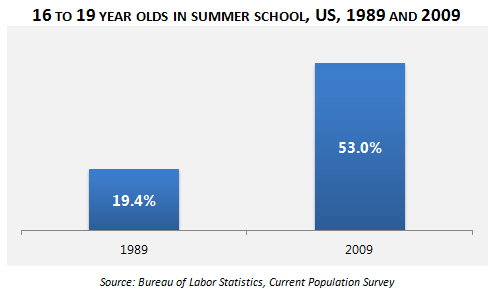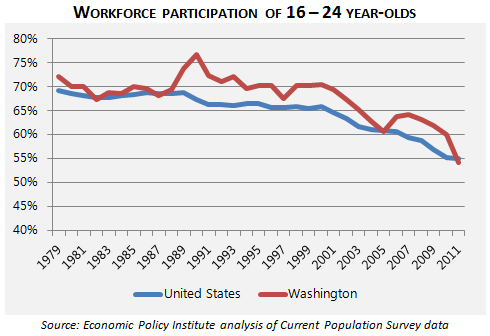 Today the Senate Labor & Workforce Development Committee is holding a work session on teen unemployment, at which they are discussing Senate Bill 5275. SB 5275 would “allow employers to pay a training wage for a specified period of time,” giving employers the to authority to pay workers of any age and skill level less than the minimum wage for about 4 months of full-time work.
Today the Senate Labor & Workforce Development Committee is holding a work session on teen unemployment, at which they are discussing Senate Bill 5275. SB 5275 would “allow employers to pay a training wage for a specified period of time,” giving employers the to authority to pay workers of any age and skill level less than the minimum wage for about 4 months of full-time work.
Currently, employers are allowed to pay a sub-minimum wage only to learners, student workers, apprentices, workers under 16, and individuals with a physical or mental deficiency or injury.
Curiously, the work session – which has a stated purpose to investigate “teen unemployment” – is considering a bill that would allow employers to pay the wage for 14- and 15-year-olds to workers of any age, and with any level of experience.
EOI Policy Director Marilyn Watkins is testifying at that hearing, and has quite a bit of information showing that Washington’s minimum wage is unrelated to youth unemployment levels. In fact, the workforce participation rate of youth and young adults in Washington has been above the national average for most of the past 2 decades. I’ve posted snippets of her testimony below.
————
Economists have identified a number of factors that contribute to the decline in teen and young adult employment. These include:
1. More youth attend school. Attendance in summer school has increased nearly 3 fold over 20 yrs. College attendance has also continued a long-term upward trend. As you’d expect, teens enrolled in school are less likely to be working.
2. A second factor in reduced teen employment is greater academic pressures, including longer school years and tougher graduation requirements. The average credits required to graduate from high school rose from 21.6 in 1982 to 26.7 2005.
3. Federal support for youth employment has fallen – including ending of the specific program for summer jobs for disadvantaged youth in 2000 (Summer Youth Employment Training Program).
4. The two recessions over the past decade have also hit youth and young adults who are typically the last hired and first fired.
Washington’s teen unemployment rate is unfortunately high. In fact, 5 of the 7 states with the highest teen unemployment are the 5 western most contiguous states, including our neighbor Idaho with the federal minimum wage. But Washington’s minimum wage is unrelated to youth unemployment. In fact, the workforce participation rate of youth and young adults in Washington has been above the national average for most of the past two decades.
Some earlier research indicated that there might be a small amount of job loss associated with raising the minimum wage. However, those studies failed to take into account regional variations and long term economic trends. The most recent, economically sophisticated studies have far more data available, and are able to account for these differences. Contrary to earlier minimum wage studies, these newer studies find no significant impact on employment numbers resulting from minimum wage increases.
These newer studies have found that an increased minimum wage did result in:
- Higher average monthly earnings for all groups, especially for teens in restaurants.
- Substantial drops in job separations and turn over.
- No substitution of teens for older workers.
When workers stay in their jobs longer, employers have lower hiring and training costs, and productivity increases. This helps explain the ability of employers to pay higher minimum wages without reducing jobs.
More To Read
April 17, 2024
2023-24 Impact and Gratitude Report
Reflecting on a year of progress and transition at Economic Opportunity Institute
April 12, 2024
Welcoming our New Executive Director, Rian Watt!
EOI is excited to begin its next chapter under new leadership
April 4, 2024
Is There a Valid Argument Against Cost-Free College in Washington?
Cost-free college is a meaningful investment that would change lives. What's stopping Washington from making it happen?


